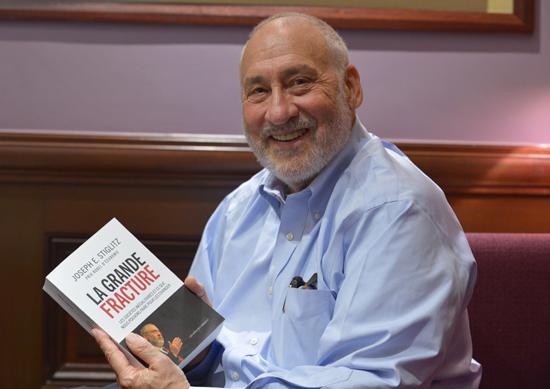You are here
France 'intimidated' by Germany on economic policy — Stiglitz
By Agencies - Aug 31,2015 - Last updated at Aug 31,2015

PARIS — France has been intimidated by Germany into pursuing an economic policy that isn't working, according to Nobel Prize winner economist Joseph Stiglitz.
"There is a kind of intimidation," Stiglitz, an outspoken opponent of austerity policy, said of the influence of Germany over the economic policy pursued by President Francois Hollande.
Stiglitz also said he agreed with former Greek finance minister Yanis Varoufakis that Germany's intransigence against Athens was aimed at striking fear in Paris and convincing the French government to continue austerity policies.
"The centre-left government in France has not been able to stand up against Germany" on its budget policy, eurozone policy, or on the response to the Greek crisis, said the former World Bank chief economist and adviser to US president Bill Clinton.
Regarding the European Union, he criticised Brussels for focusing on nominal deficits of member states rather than those adjusted for the economic cycle, as well as the policy response.
"Cutting taxes and expenditures contracts the economy, just the opposite to what you need," Stiglitz indicated in an interview on Monday. "I do not understand why Europe is now trying that after all the evidence, all the theory says it does not work."
He remarked that the "totally discredited" policy now only has support in Germany and a few people in France.
Stiglitz, who is in France to promote the translation of his latest book, "The Great Divide", said the "centre-left has lost confidence in its progressive agenda".
He noted that former British prime minister Tony Blair, ex-German chancellor Gerhard Schroeder and US President Barack Obama all supported the "banking system, have supported deregulation, trade agreements that are bad for ordinary workers".
Stiglitz said Schroeder can be viewed as a success from the point of view of accomplishing a so-called internal devaluation when competitiveness is increased by reducing wage costs, but that "you make ordinary workers suffer".
He added that before the global economic crisis France had been one of the nations that had most embraced equality, but that austerity policies have put that at risk.
"The policies of austerity are at the heart of the increase in inequality," Stiglitz stressed
Separately, Germany posted a record-breaking 21-billion-euro surplus in the first half of 2015 but has turned a deaf ear to criticism from home and abroad that it should cut taxes or raise public spending to help alleviate pressures in the eurozone.
Despite calls from its European Union (EU) partners and the United States to ramp up spending on infrastructure after years of neglect, the government said it will stick to its austerity course and goal of achieving sustainable balanced budgets.
Economists believe Chancellor Angela Merkel's conservative-led government is also tacitly trying to teach other EU governments the virtues of balanced budgets as a cure for the eurozone crisis. Her party is expected to use Germany's return to budget surpluses as a cornerstone of its 2017 election campaign.
"Balancing the budget was a central pledge in the 2013 election and they want to tick that box," said Carsten Brzeski, chief economist at ING-Diba, adding that Finance Minister Wolfgang Schaeuble wants to show Europe he "practices what he preaches".
"There's a horrible lack of investment in the economy yet the government is running an enormous surplus. It doesn't add up. More flexibility would be good. With such low interest rates they should reconsider. But flexibility isn't in the German DNA," he indicated.
In Brussels, the European Commission urges Germany to use its "fiscal space" to promote growth in the EU..
French Economy Minister Emmanuel Macron told a Berlin audience last week that Germany may have gone too far with austerity.
"Germany can make a mistake of 'over-consolidating'," he said.
But Brzeski remarked that foreign leaders are giving up arm-twisting "because Schaeuble has convinced them he won't spend any more".
Schaeuble mantra
The government said on Tuesday Germany's budget surplus was 21.1 billion euros in the first half, or 1.4 per cent of the gross domestic product (GDP). About half of the surplus came from the federal budget, which was boosted by a 4.4-billion-euro windfall from the sale of mobile phone frequencies.
The first half surplus was larger than Iceland's entire 2014 GDP.
Whereas France, the eurozone's second biggest economy, is still struggling to bring its deficit down to below the EU's 3 per cent cap, leaving Paris little room to boost still-fragile growth rates.
Schaeuble planned a balanced budget in 2015, not a surplus. He and officials in his ministry have kept mum about the surplus but in July he told trade magazine DBB: "The plan through to the 2019 budget is no new debt. If there were to be added scope, we'd use that for important investments for the future."
Defying the eurozone crisis that crippled growth and caused tensions, Germany's federal government posted a 500-million-euro budget surplus in 2014, its first surplus since 1969.
At the same time, Germany's infrastructure investment has lagged for years. A group of mayors said last year that 118 billion euros of investment was needed for roads and buildings, while another public committee has called for investments of 7.2 billion euros a year to fix public transport infrastructure.
Charles Blankart, a public finance professor at Humboldt University, says the government has scope to raise infrastructure spending. "But it won't help French or Spanish companies if Germany builds more roads."
The budget surplus has also prompted calls for tax cuts, especially the so-called "cold progression" (or bracket creep) as well as a "Solidarity Tax" used to finance unification.
"This record surplus shows the 'Solidarity Tax' is no longer needed," Frank Steffel, a member of parliament in Merkel's party, told Reuters. "It would cause no pain to cut that now."
Steffel remarked that Germany should open its wallet now.
"The considerable surplus should be given back to taxpayers," he said. "And investment spending, especially for education and infrastructure, would be a most effective instrument."
Related Articles
BRUSSELS — Greece on Monday agreed to compromise on new bailout reforms in a bid to break a deadlock with its EU- International Monetary Fun
Germany strongly signalled Monday it will continue to push for fiscal austerity in Europe alongside Spain, even as France was thrown into political turmoil over its economic policy.
FRANKFURT — Germany's Bundesbank took more than 200 tonnes of its gold back to Frankfurt from overseas last year, the central bank said on W


















